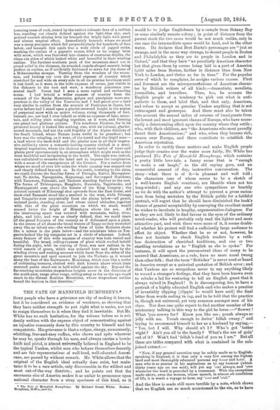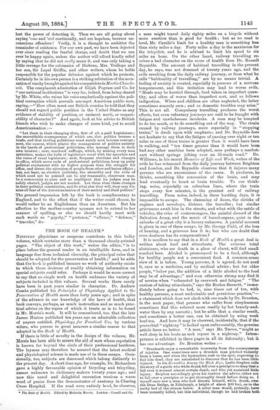THE FATE OF MANSP ibLD HUMPHREYS.*
SomE people who have a grievance are shy of making it known, lest it be considered an evidence of weakness, as showing that they have neither strength to put right what is amiss, nor yet to resign themselves to it when they find it inevitable. But Mr. White has no such hesitation, for the volume before us is evi- dently written with the express object of remonstrating against an injustice commonly done by this country to himself and his compatriots. His grievance is that a vulgar, slangy, unmannerly, whittling, free-and-easy rnffian, who chews and spits wherever he may be, speaks through his nose, and always carries a bowie7 knife and pistol, is almost universally believed in England to be the typical Yankee, whilst men who behave themselves decently and are fair representatives of well-bred, well-educated Ameri- cans, are passed by without remark. Mr. White allows that the original of the English ideal actually does exist, but main- tains it to be a rare article, only discoverable in the wildest and most out-of-the-way districts ; and he points out that the enormous size of America makes it as unfair to pronounce upon national character from a stray specimen of this kind, as it • Tho Pots of Maesfield Humphreys. By Richard Grant White. Horton : Houghton, Mifflin, and Co.
would be to judge Englishmen by a sample from Botany Bay or some similarly remote colony ; in point of distance from the parent stock the two cases would be not much unlike, only in one case the intermediate space would be land, and in the other water. He declares that Bret Harte's personages are "just as strange, and in the same way strange, to decent people in Boston and Philadelphia as they are to people in London and in
Oxford," and that they have "no peculiarly American character but that given them by scenes being laid in a part of America 3,500 miles from Boston, farther in distance than from New York to London, and thrice as far in time." For the popular
error of which he complains, he assigns various causes. First and foremost are the misrepresentations of American charac- ter by British writers of all kinds,—dramatists, novelists, journalists, and travellers. Then, too, he accuses the English people of a tendency -to pick out what is anti- pathetic to them, and label that, and that only, American, and refuse to accept as genuine Yankee anything that is not extravagant and grotesque. And there must also be taken into account the annual influx of swarms of immigrants from
the lowest and most ignorant classes of Europe, who have neces- sarily a deteriorating effect upon the country where they settle ; who, with their children, are " the Americans who most proudly flaunt their Americanism ;" and who, when they become rich,
swarm over Europe, and there contribute to establish the American reputation.
In order to rectify these matters and make English people judge their cousins over the water more fairly, Mr. White has produced The Fate of Mansfield Humphreys, which contains a pretty little love-tale, a funny scene that is "enough to make a cat laugh," as the old saying goes, and an unmerciful amount of dry, instructive conversation. The story—what there is of it—is pleasant and well told ; the characters (one of whom seems to be a sketch of a well-known English countess), are likeable when not too long-winded ; and any one who sympathises as heartily as we do with the author's attempt to prevent a gross carica- ture from being mistaken by the British public for a faithful portrait, will regret that he should have diminished the book's chance of general acceptability by conveying the excellent moral he wishes to inculcate in lengthy, argumentative dialogues. For as they are not likely to find favour in the eyes of the ordinary novel-reader, who will probably only read the lighter and more attractive part, and wish there were more of it, it seems doubt- ful whether his protest will find a sufficiently large audience to effect_ its object. Whether that be so or not, however, he does not hesitate to shock English readers by a ruth- less destruction of cherished traditions, and one or two startling revelations as to " English as she is spoke." For instance, it will upset the preconceived ideas of many to be assured that Americans, as a rule, have no more nasal twang than other folk ; that the term "Britisher" is never used or heard in America except as a quizzical quotation of British error ; and that Yankees are so scrupulous never to say anything likely to wound a stranger's feelings, that they have been known even to rebuke a lad for venturing to tell an English guest that it always rained in England ! It is discomposing, too, to have a
portrait of a highly educated English earl who makes a practice of invariably clipping [clippie' he would have said] the final
letter from words ending in ing, and to be told that the practice is, though not universal, yet very common amongst men of his
class. Nor does one quite expect to find another member of the aristocracy talking in this way to the girl he loves :—" Sowwy !
What 'you sowwy for P Know you like me ; youah always so jolly with me. Youah enough to dwive ' fellah cwazy ;" and trying to recommend himself to her as a husband by saying,— " Yes, but I will. Why should n't I P Who's got ' better
wight P Ain't you all in the family P What's the use of goin' out of it ? Won't find ' fellah 's fond of you as I am." But all these are trifles compared with what is contained in the sub- joined extract "Now, if any general assertion may be safely made as to English- speaking in England, it is that only a very few among the highest bred and most thoroughly educated persons say home and hotel. A man who is so precise in his aspirations as to say humour (which thirty years ago no one said), will yet say 'otel always, and 'onus whenever the word is preceded by a consonant. With the exceptions made above, even the women, whose speech, in almost all conditions of life, it is worth a voyage to hear, say 'ome and 'otel."
And the blow is made still more terrible by a note, which shows that we English are so much accustomed to the sin, as to have lost the power of detecting it. Then we are all going about saying 'ome and 'otel continually, and are hopeless, because un- conscious offenders! Verily, it is a thought to embitter the remainder of existence. For our own part, we have been dejected ever since reading the fearful charge, and doubt that we can ever be happy again, unless the author will afford kindly relief by saying that he did not really mean it, and was only taking a little revenge for the calumnies of Dickens, Mrs. Trollope and her son, Sir Lepel Griffin, and other writers, whom he holds responsible for the popular delusion against which he protests. Certainly he in his own person is a striking refutation of the accu- sation of vanity brought against his compatriots in Martin Muzzle- wit. The complacent admiration of Elijah Pogram and Co. for " our national institutions " is very far, indeed, from being shared by Mr. White, who raises his voice emphatically against the poli- tical corruption which prevails amongst American public men, saying,—" How often must our British cousins be told that they should not regard public position in the United States as any evidence of stability of position, or eminent merit, or reaped- ability of character ?" And again, look at his advice to British friends who wish to make changes of some kind, yet to avoid Americanisation :—
" Let them in their changing shun, first of all, a paid Legislature ; the unavoidable consequences of which are, that politics become a trade, and that trading politicians must surely soon become corrupt ; next, the caucus, which places the management of politics entirely in the hands of professional politicians, who manage them in their own interest ; next, manhood suffrage, which, by making every man articulate, makes the halls of legislature vocal with the speeches and the votes of venal legislators ; next, frequent elections and changes in office, which serve ends of professional politicians, keep up petty political excitement with no higher purpose than the struggle for office, and divert the attention of people from other and better affairs ; last, not least, an elective judiciary, the absurdity and the evils of which need not be pointed oat to any reasonable, observant man. In a community so pare and so intelligent that its judges may be safely elected, judges are not needed. Let them shun these changes in their political constitution, and do what else they will, they may dis- miss all fear of the Americanisation of their society and their politics."
The general impression left by the book is complimentary to England, and to the effect that if the writer could choose, he would rather be an Englishman than an American. But his affection to the mother-country appears not to extend to her manner of spelling, or else we should hardly meet with such words as "gayety," "pretense," "offense," "defense," " traveler," &c.



































 Previous page
Previous page